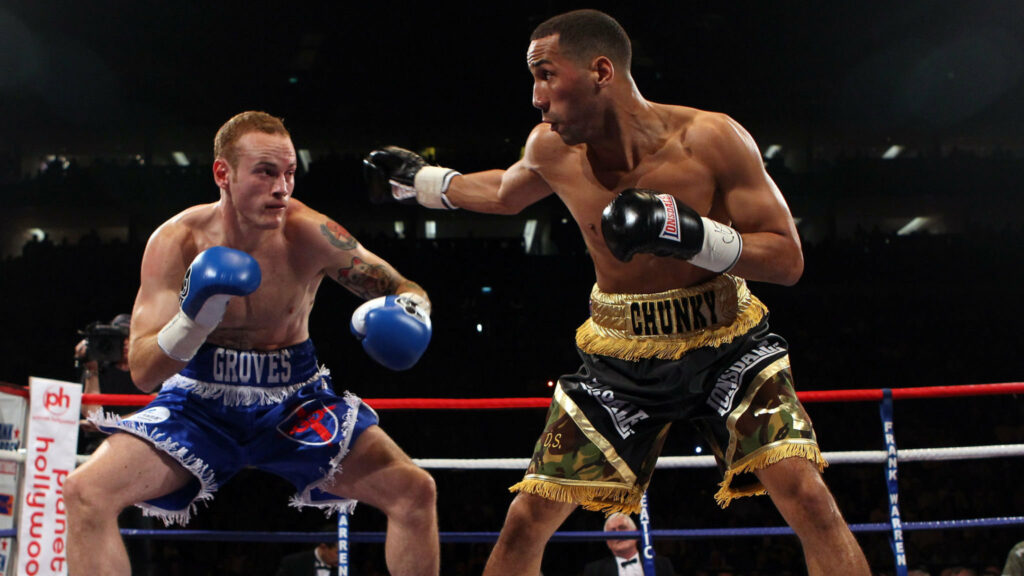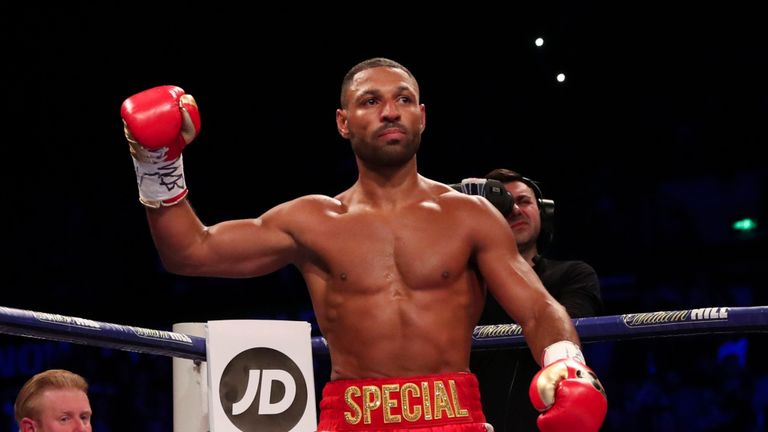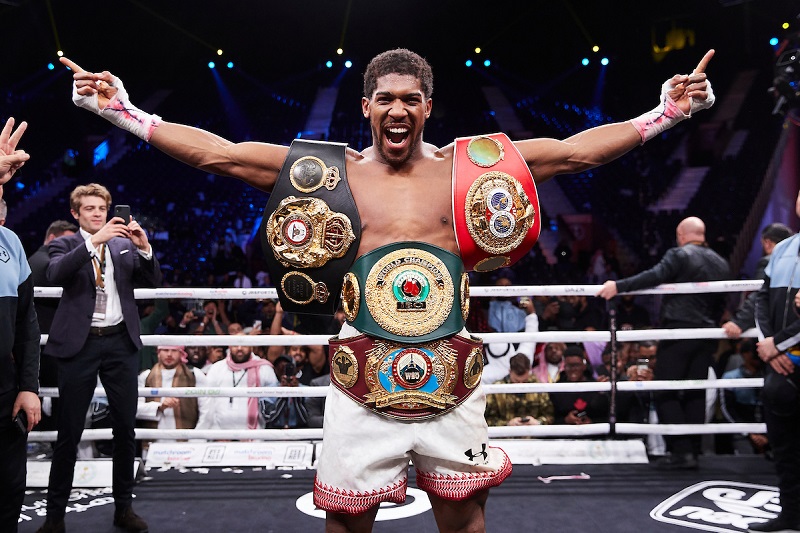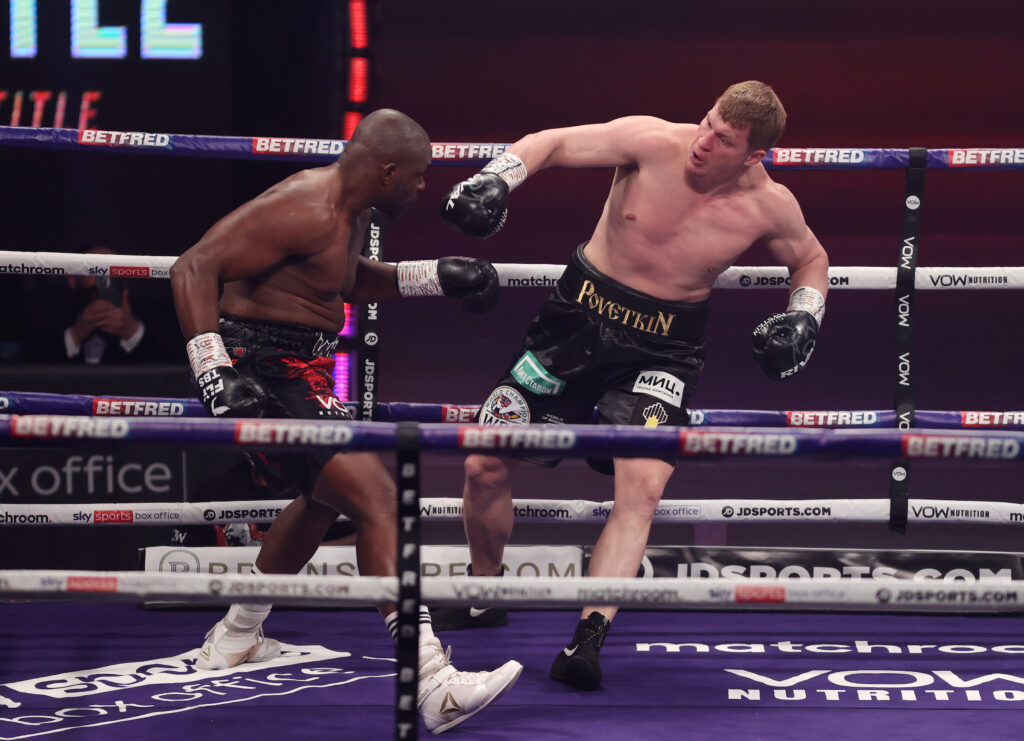WHEN The Athletic reported that Eddie Hearn and Matchroom are set to sign a five-year deal with DAZN and move away from Sky Sports from July onwards after honouring the extension they signed in 2015 by putting on two more shows it should not have come as a surprise to anyone who has followed the sport for more than a minute. In fact, Sky’s up-and-down, boom and bust recent relationship with boxing was crystalised on May 25, 2011. That is when they set out on this current course.
On that night, George Groves defeated James DeGale by majority decision to annex the British and Commonwealth super-middleweight titles at the O2 Arena in London. It was an unremarkable fight with a remarkable build-up as Dave Coldwell, the then-Head of Boxing at Hayemaker Promotions, had won the purse bid to stage the contest by offering up a whopping £400,000.
The BBBofC released a circular stating that Coldwell had won the bid and it would take place on April 9 at Liverpool’s Olympia venue. After private negotiations between the parties, Frank Warren added the fight to one of his shows, yet the only way Warren and Sky could do it was by making the event PPV.

It was initially due to take place on the undercard of Nathan Cleverly’s WBO light-heavyweight challenge against Juergen Braehmer only for that fight to fall through when the titlist suffered an eye injury in training. On paper, it appeared that Warren had put a great bill together; on canvas, though, the great show did not materialise and the event itself was not PPV quality in any way, shape or form.
After the final bell sounded on DeGale-Groves, I made my way to the press room with a member of the Sky team. They told me that the current set-up was untenable and that changes needed to be made. By September of that year, Warren had left Sky and launched Boxnation.
Sky also severed ties with the likes of Hatton Promotions — a cruel blow for Ricky Hatton given that it was done via email despite all the money and big nights he had brought to the station — and Eddie Hearn and Matchroom became Sky’s sole provider of boxing content.
Prior to announcing the deal, Hearn had made his intentions clear when talking to me for BoxingScene : “We’ll make an announcement very soon about our position with Sky,” he said in August 2012. “There’s reports and Sky have shown a confidence in us. We’re in a position where lots of fighters want to sign with us, so I just want to be careful and make sure I can keep my promises to fighters because that means a lot to me.”
A few weeks later the deal was done when Hearn announced: “I am delighted that Matchroom has reached this ground-breaking agreement with Sky Sports. The future of boxing for fight fans and TV viewers is deeper bills with more title fights and more competitive fights in packed out arenas.” The DAZN deal has been announced as “Groundbreaking” as well as it is a move to a different type of platform for the promotional outfit.
The aforementioned word “Content” sounds a bit hollow and soulless to many traditional boxing fans, we just want good fights — and British title fights tend to provide them. For all the talk of how Sky had downscaled in the mid-2000s by putting on Friday night shows in leisure centres, we were served up some really good fights, with Jamie Moore’s 10th-round British light-middleweight title win over Matthew Macklin at the George Carnall Leisure Centre in September 2006 the exemplar of this type of night.
However, the problem of requiring PPV funding for fights like DeGale-Groves was an issue and, despite having the major British promoters on their roster, Sky were unable to consistently make key inter-promotional fights.

Hence the exclusive deal with Hearn, who was putting together decent shows with Matchroom’s existing fighters or with free agents while in the background members of the team were working furiously to sign Warren’s biggest names. They would then announce them and put on event fights such as Kell Brook’s “Secret” big name opponent, which everyone knew in advance was going to be Matthew Hatton despite the decision to stage an unveiling.
Brook was a major signing for Hearn. However, the relationship has since soured. When exploding onto the scene, Hearn told me that he was the polar opposite of Warren due to his close personal relationship with his fighters. The reality was always that they are two sides of the same coin. This not a slight on either promoter, boxing is a complex, circular sport and the only thing that is predictable about it are the love-ins, subsequent falling outs and endless contract talks plus litigation.
It was a monopoly, and they never work, but this one did work for a while. Carl Froch against Lucian Bute took place on regular Sky TV. Other fights did, too. In May 2013, though, I spoke to Hearn for BoxingScene about the new deal and the possibility of PPV coming back after the announcement that Carl Froch’s rematch against Mikkel Kessler was taking place on the platform, he said: “As I said, it is every fighter’s ambition to be a pay-per-view fighter, but the policy is not to just get pay-per-view back in.
“If the fights are big enough then you can bring it in, if it is not then just continue to build, build, build…That’s important, especially with our mission because fan perception of what we’re doing is important, we don’t want them to think: ‘Oh, Froch-Kessler’s pay-per-view so that’s how it is going to go now,’ — it isn’t.
“Froch and Kessler is a freak fight that comes around once in many years, especially in the UK, so when we signed David [Haye] people came out and said it would be another pay-per-view, but it isn’t — what I’m saying is that pay-per-view should be for something very, very special.”
Not too long thereafter PPV did make like Take That and come back for good. In fact, it came back with a vengeance and we ushered the vampire back into our home — we always do.

Another key factor was the emergence of Anthony Joshua. He was destined for PPV and some of the shows were worth the extra money. Increasingly, though, it reached the point where Hearn was putting on some of the worst pay-per-views cards the sport has seen simply to make a decent main event, or a half-decent main event in recent cases.
However, when Joshua was brought in to spearhead Matchroom’s continuing US growth it turned into a disaster as he was stopped in seven by Andy Ruiz in 2019. Comeback wins over Ruiz and Kubrat Pulev — both on PPV and with a price increase to £24.95 — have polished the turd of the continuing failure of all parties to pit him against Tyson Fury, who stole a march on Joshua with a draw and a win over former WBC holder Deontay Wilder.
We are told the fight will still be made, and shown on Sky and BT Sports in the UK and DAZN internationally, as Joshua is technically a free agent, yet we are so jaded we will not believe it until we see them in the ring together.
One Sky insider told me that the exclusive deal with Hearn prevented them from signing Fury despite the fact the network was desperate to work with “The Gypsy King” again. It was always unlikely that Fury and Hearn would jive as personalities, so the Joshua fight always seemed a million miles away despite the public proclamations that it was doable.
The failure to lure Fury in, in any capacity, has long been a thorn in Sky’s side and continues to be a problem as some of their current fighters have gone down the media trained route that has reduced footballers to automatons who just spout cliches.
The reason the likes of, say, Scott Fitzgerald are so popular with seasoned fans is that you know they are saying what they think and feel. It makes for an unpredictable brew yet amongst the online community — a group that broadcasters sometimes disparage yet desperately need — Fitzgerald’s win over Anthony Fowler is still one of their most memorable and fondest fights in recent years.
A recent nadir has been the recent emergence of Dillian Whyte as a PPV “star”. Sure, he is decent to watch in interviews and has had some solid wins, but the problem stems from the fact that his best result is a seventh-round loss to Joshua and his best win came over former WBO holder Joseph Parker. A brace of wins over Dereck Chisora took place on PPV shows and with the best will in the world — and I love Chisora — the rematch was not worth shelling out for and should have taken place on regular Sky.
To exacerbate the issue, the fight nights that do take place on regular Sky, the ones we are disingenuously told we get for “free” yet have to pay a subscription for, are either low quality infomercials for bigger, PPV fights or just thrown together to make up the numbers. Once in a while they serve up a fight that catches fire and it makes us boxing fans think: ‘That was great! I can’t believe I have been so critical of Sky’.
I know people who buy drugs. Over the years they have relayed their experiences to me. I also have probably previously mentioned that I really like the film Candy, in which Heath Ledger says: ‘They say for every 10 years you’ve been a junkie, you’ll have spent seven of them waiting around’.
Boxing promoters would make fine dealers. At first, a new dealer will serve you up a great bag of produce and tell you they have put a little bit extra on top. Over time, they give you a little bit less, and what you get has been either stretched out and stepped on or is simply no good. Then you end up having to pay that little bit more for the same product as you are addicted to it. And then they stop selling it in weight. Eventually, you will have to pay a lot more for a lot less and are made to wait for it.

Picture By Mark Robinson/Matchroom Boxing
The global pandemic exacerbated this situation. We have had some good fights, some middling fights and some absolutely appalling ones. Sky hit a new low when Whyte rematched the over-the-hill Alexander Povetkin in March. I refuse to believe that I am not the only boxing fan out there who kept checking to see if their Sky remote was set to x2 on the rewind option when watching the two heavyweights slowly manoeuvre their way around the ring.
Increasing PPV prices during this period may have been economically viable and necessary for the parties involved, but it was a bad look for a boxing broadcaster that has completely lost its way in recent years. The lack of value is stark for those of us who remember the 1990s crossover nights of boxing when we would go from a UK show to a US one and get up to eight hours of boxing.
Sure, the quality was not always there and there is an element of looking back on those PPVs with rose-tinted glasses, yet it is hard to argue against the fact that we regularly had bigger names, better fights and more bang for our buck.
Sadly, Sky has been getting it wrong far too often in recent years. They gained casual fans, which is great when you have crowds, only to lose the trust and patronage of the hardcore ones; the British title has been devalued, fans have been rinsed by price increases and, despite amazing hype and great production values and a brilliant production team, they can no longer piss on our backs and tell us it is raining. They lost the trust of their core viewership, never a good thing, and know they have lost most of their content.
Sky needs to make a return to form. Friday night fights for the British title in smaller venues would be a good start. People talk about Moore-Macklin yet even little nuggets like Matthew Thirwall’s ninth-round win over Donovan Smillie in January 2006 would be welcomed with open arms these days.
Then they can work on what to do when Saturday is the night for fighting. I know for a fact that some members of the Sky team would like a return to working with more promoters, therefore more scope for making fights, the broadcasting of small hall shows and a more proactive approach to making the promoters on their books produce genuine 50-50 fights.
Football fans have shown that there is still fan power by lobbying against the proposed European Super League. Boxing fans draw far less water as too many of those ruining the game do not care about serving up quality to the hardcore fans, especially during the pre-Covid ‘Bums on seats’ era.
Still, time has moved on and changes need to be made if we are going to emerge from this crazy period with a sport, and product, that is still worth our while. One that is given the respect it deserves. As Ledger said in Candy: “If you’re given a reprieve, I think it’s good to remember just how thin it is.”
Fingers crossed.
